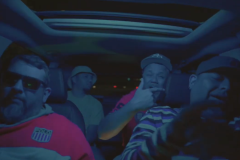From The Horse's Mouth: Alden Penner on Exegesis
Montreal Canada’s Alden Penner is a songwriter and musician who is perhaps best known as founding member of critically acclaimed bands such as The Unicorns and Clues. His solo recordings and film scoring have also been known, cherished and circulated by devoted fans and record labels since the early 2000s.
Penner has been involved in music since his early years growing up in rural Quebec taking piano and flute lessons. He continued with trumpet, percussion and bass guitar in school band after moving to B.C. at age 9, and eventually took up the electric guitar and singing. Some of his first bands started in Campbell River while attending high school and working events in a jazz ensemble with his geography teacher. Alden Penner and Nick Thorburn (Islands) formed the Unicorns out of high school. In 2003, after moving to Montreal, they recorded the widely celebrated Who Will Cut Our Hair When We’re Gone?
Until now, his only formal releases as a solo artist have been a handful of limited-run singles and 2 EP’s, with the most recent one being 2013’s Precession, 4 songs which received glowing reviews and are featured on his debut album Exegesis.
Ghettoblaster recently spoke with Penner about the album. This is what he told us about it.
When did you begin writing the material for your most recent album?
I think the earliest writing dates from after The Unicorns, around 2005 or 2006 and it comprises music that never made it onto other albums or projects. There stands to be more material like this for my next couple of albums. The most recent material on the album has not been fully written as of the writing of these lines. This is because my process of making an album allows for writing, recording and mixing to become organic. They are essentially part of one process.
What was the most difficult song to take from the initial writing stage through recording and mixing?
There were quite a few actually. Again, I am still working through some of the material less than a week before mastering! Some of the songs have been recorded and re-recorded several times. Some have been easily recorded once. One problem that arises often is that recording a song permits you to listen to a song as a listener rather than a performer, and to then manipulate sounds further, to a point where the song’s origins may be hardly recognizable. Listening to an initial recording may also reveal that a song lacks potential as it is.
“Louis XIV” was pretty hard, not because of its structure, because I have a demo from 2007 or 2008 and it didn’t change much structurally, but because it has so much constant change within it, as a composition. It’s like it’s uncomfortable being called a song from start to finish. It never settles. The amount of working and re-working of basically every instrument and several vocal takes was initially discouraging. It felt like it just couldn’t be tamed. But then there were a couple turning points where things started sounding better. Initially it was a technical improvement–adding a particular kind of compression and equalization to the drums. Then it was an improvement on some of the guitar sounds and playing. As I went along I got a lot better at knowing when to mute (often) different elements of the mix and bring them back in. Reaching that point was interesting because it also revealed that all those decisions hinged on the inherent structure of the song. It was like re-discovering the song and the impulse that created it as something with a foundation and a logic. I also re-wrote some of the lyrics to refer more specifically to Louis the 14th.
Which of the songs on the record is most different from your original concept for the song?
I could name a few. I guess “We Seek” is one that got quite transformed, even though there is no real demo version to show the evidence of this transformation. But I carried it in my mind for a while as just a guitar-based song with a singing line. The addition of electronic elements changed its identity quite a bit, as well as the placement of background vocals.
Did you have any guest musicians play or sing on the record?
Laura Crapo co-produced the record along with me and she also sang on two songs. As a co-producer she provided initial encouragement in getting the album to even happen. I had a collection of recordings that had been started but never completed when we decided to make an album in the summer of 2013. The first song I was working on then doesn’t appear on the record though. It was a challenge to just get focused and determined and that’s where Laura was very supportive. She has a great ear and taste in music, so she provided a lot of listening material I hadn’t been exposed to while recording. She is also a healer, so she laid this foundation of being detached from ego, of just making something that’s cool, rather than trying to be cool. She also gave a lot of advice about which vocal take to use, when to re-record the drums or something else. If she were commenting, she would probably say that the main thing she wanted to hear was sexiness.
Is there an overarching concept behind your new album that ties the record together?
If that were so I would probably have called it Sexegesis! I guess I could make a remix album with that title and make everything have an unbridled sexuality. I was actually thinking about doing more electronic type music. Because the songs have diverse origins I can’t really call this a concept album from start to finish, besides that it’s a collection of songs filtered through my mind at a particular time when I have been thinking about religion and spirituality quite a bit. I think we come from a very religious society and much of our modern culture is interested in denying that or having a biased historical perspective on it, removing us from our past. I wanted to loosen myself from the grips of academic, institutional and hyper-subjective views on religion and spirituality and just kind of explore things with an open mind, with a particular interest in artistic expression, rather than scriptural interpretation or some other form of opinion. That way, what I have made stands on its own as a very personal statement, which is not in any need of approval or disapproval from a community of believers or non-believers. That’s one way of looking at the album, but there definitely others. Each song kind of tells its own story too.
Have you begun playing these songs live and which songs have elicited the strongest reaction from your fans?
I have played some of these songs before, with bands and alone. It depends, but in a live setting we are oftener compelled by sonically pleasing sound artifacts rather than compositional integrity, so it’s hard for me to gauge what people are most receptive to in that environment and for what reasons. It’s going to be a bit of a testing ground because I haven’t played my own material under my name that much. I guess some of the more rhythmically upbeat songs elicit a visceral response, and that’s a very human thing, to want to dance and move around. Some fans have written to me over the years about some of the songs on the album, hoping to hear a recorded version because they had heard it live or from a live video. So I guess “A Beautiful Dream” and “Losing My Head” will probably be crowd pleasers. But it’s sometimes very different what makes a good recording and what makes a good live performance, so I’m looking forward to seeing that.
(Stream Alden Penner’s Precession EP here!)









Social Media